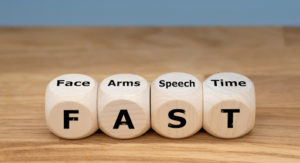Recognise the signs of a mini-stroke
Read time: 3 mins

Having a stroke is a frightening experience, which over 100,000 people go through each year in the UK. Yet every year, many more people will have a transient ischaemic attack (TIA), better known as a mini-stroke. Sadly, many people remain unaware of the link between having a TIA and the risk of a stroke and fail to ask for the medical help they need.
Experiencing a mini-stroke is not a minor event. It’s the body’s way of warning there could be something more serious to come. One in twelve people who have a TIA will suffer a stroke within the next week.
Symptoms of TIAs are very similar to that of strokes, but they’re milder and often only last a little while, maybe just a few minutes. Because of this, many people dismiss the first signs of a mini-stroke as having a “bit of a turn”. However, seeking immediate medical help after noticing mini-stroke symptoms is critical for preventing something more severe.
Recognise the signs
Strokes and TIAs are most usually suffered by people over fifty, but they can happen to anyone at any age, even children. That’s why it’s critical to recognise mini-stroke symptoms as soon as possible, whether they are happening to you or someone else.
The best way to recognise a mini-stroke or stroke is to use the FAST method for assessing symptoms. This is the method recommended by the NHS and the Stroke Association.
FAST stands for:
- Facial weakness: Has someone’s mouth or eye drooped? Can they smile? Does one side of their face feel numb?
- Arm weakness: Do they have trouble lifting both arms, or does one feel numb?
- Speech problems and stability: Is someone slurring their words? Do they seem confused, or have they lost coordination and balance?
- Time: If the signs are there, it’s time to call 999.
Mini-stroke recovery, risk and prevention
Mini-strokes occur for the same reason as 85% of major strokes, which are caused by a blockage in the brain. These are called ischaemic strokes. Mini-strokes and ischaemic strokes are caused by a disruption in the blood supply to part of the brain. The obstruction is sometimes caused by a blood clot, which can form in an artery leading to the brain or within blood vessels deep inside the brain. The remaining 15% are a type known as a haemorrhagic stroke. These happen when bleeding occurs in or around the brain.
Factors that raise the chance of having a mini-stroke include:
- Gender: Men have a greater risk of suffering a mini-stroke from an earlier age.
- Age: Arteries harden and narrow as we get older, increasing the chance of a blockage.
- Family: Anyone with a close relative who’s suffered from a stroke or mini-stroke is more likely to suffer one themselves.
- Ethnicity: In the UK, black and South Asian people are at higher risk of having a mini-stroke.
- Underlying medical conditions: Diabetes, high cholesterol, high blood pressure, and atrial fibrillation (a fast, uneven heartbeat) increase the risk of a mini-stroke.
Fortunately, there are many simple things we can all do to reduce the risk of a mini-stroke. Quitting smoking, reducing alcohol consumption, not using recreational drugs, enjoying a healthy diet, and regular exercise all help.
If you’ve suffered a TIA or stroke, emergency treatment is crucial. Our multi-disciplinary team of stroke consultants, physiotherapists, occupational therapists, dieticians, speech and language therapists and neuropsychologists are on hand to support your recovery at our specialist private stroke clinic.
Recovering after such an event requires time and patience, often lifestyle changes, and the support of clinical teams who have the knowledge and expertise to create tailored stroke recovery programmes.
Remember, a TIA may not feel or appear as serious as a stroke, but you should never ignore it. It’s the body’s way of sending an important warning signal.
If you have any questions about mini-stroke symptoms and recovery, contact our Stroke Clinic.
Posted on: 16 January 2024
Tags:
